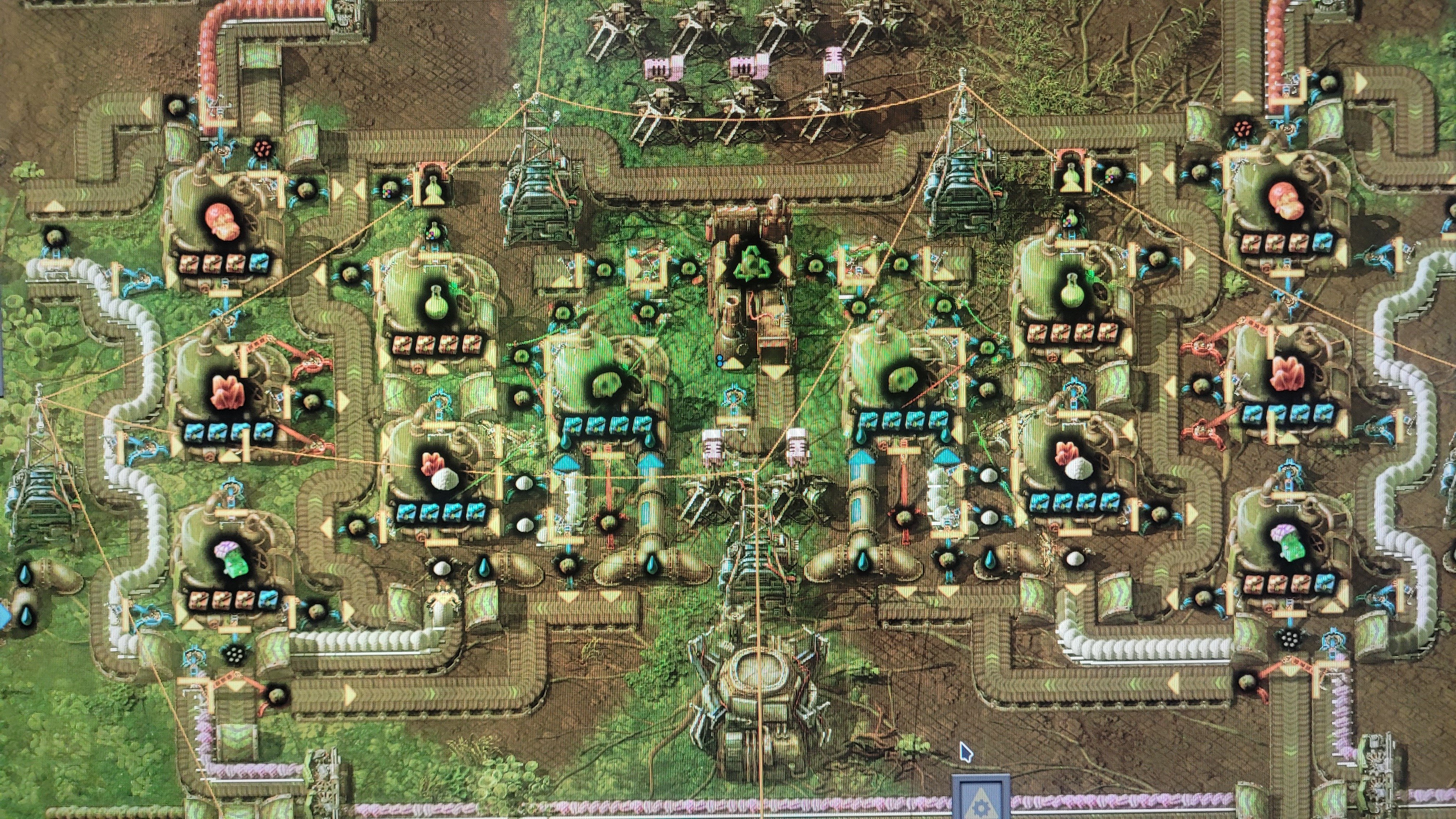I always try to do belt bases, as I prefer them. Gleba is damn near impossible. I tried to at the start but the spoilage and nutrients are just too much to handle for me. Bots to the rescue!
Surprisingly Gleba is where I’m using the least amount of bots.
I basically turned everything into sushi belts and it hasn’t been too difficult to split the spoilage off.
I haven’t really scaled up yet though, just making enough science to fill a rocket every once in a while for now.
Na, use direct insert, with belts feeding. Hardest part was the egg handling, ill post screenshot of my science when I get home

Not to be pedantic but thats a displayshot and not a screenshot. ;)
Anyways your setup is much much nicer than the pile of spaghet I left on gleba to be overrun by stompers.
Lol true, sorry my bad.
A few things to note:
- spoilage inserters should always be placed on the same belt as the last inserter that needs it. It prevents situations where the spoilage inserters still have fresh items while the machine inserter has spoilage
- heating towers are better at egg disposal. You can even get some electricity back!
- it’s better to have centralised nutriment production for your factory block. A bioflux to nutriment biolab could easily power both sides with less wastes
First one: haven’t happened yet, but good idea, I’ll adjust for that.
Second one: I would then need to run heat pipes as well, the idea behind this build was to drop and forget. Only time it breaks is if the power stops working for whatever reason (usually I’m the reason)
Third one goes back to second one, as I am producing more them enough science off one farm of each plant type, I don’t really care about any lost efficiency. Just simplicity without bots. When I end up rebuilding, ill build something more inline with ratios.
This is beautiful!
Thanks, I like it :)
Would you be willing to post a blueprint string or link to it?
Gleba has been causing me no end of issues.
For sure, in fact I’ll just make a post with all my prints.
Woot! Thank you!
My ramshackle base on Gleba is a weird mix of sushi belts and excessive bot use. Without them my design would break down.
And don’t be concerned about energy. The Gleba recipe for rocket fuel is super easy and you can easily use it to supply multiple rockets and a setup of heating towers + turbines. It’s enough to provide power to hundreds of bots and dozens of tesla towers.
I love hearing about this perspective. I 100% agree on bringing bots to every planet but found gleba to be the most belt intensive (not using the most belts but using the most belt tricks).
I think I only used bots to handle saving restart spoilage and removing eggs on factory shutdown/resuppling the initial one on startupCould you elaborate the shutdown startup phase please? I have to do it manually at the moment.
For shutdown I have a few circuits monitoring the inputs/outputs to check if we’re getting backed up or running dry on either of the fruits. If that’s the case the input belts are stopped, egg->egg duplicator inserters are disabled and the chests that hold the one egg being recirculated go into trash mode.
There is a separate unit that constantly ensures there are at least a couple eggs avaliable and “requests” (buffer chest) any excess and is surrounded by turrets.
During startup (science below limit and ingedients on input belts) the spoilage->nutrient inserter is enabled which priority feeds just the first three chambers that make flux. Once any flux has been made (>0 flux on the belt || flux->nutrient machine working) the spoilage inserter stops. That’s enough for the flux->nutrient machine to start and the whole system becomes self sustaining.
As part of startup a requester chest requests 1 egg, the rest of the egg duplicators are setup in such a way that they propagate down the line (a direct inserter between them is enabled if the recirculating chest for the next chamber is empty and the egg->sci inserter gets disabled). Once there are eggs in the recirculating chests the startup is considered complete and the requester chests turn off.There’s also a chest that pulls from the main nutrient line to make sure there’s always loads of spoilage ready for a restart.
Very interesting, thank you. I built something similar except for the eggs which I have to manually find and put into a chest to kickstart egg production. This is because if the factory is powered off there are no nutrients being made and spoilage eventually will finish and eggs will spoil. So I left that part manual.
I wonder if you found a way to produce nutrients even with the factory powered off.
There’s a small machine at the resource inputs that gets full resource priority and keeps a couple chests full of spoilage handy as well. Eggs decay fairly slowly so it doesn’t take that much to keep one circulating.
It’s not a perfect solution but saves needing manual intervention for at least as long as it takes me to look back there again- Nice
- Wait a moment: is there a way to read spoilage time left?



